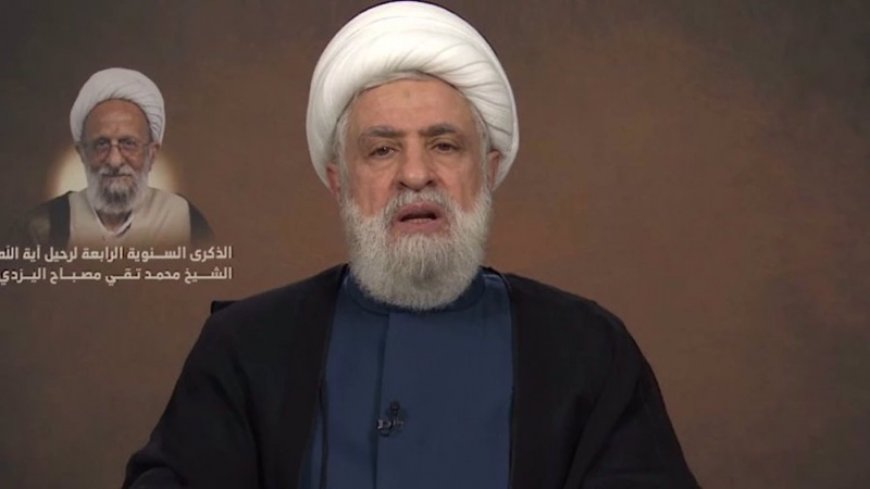Western Policies: Denying the Roots of Middle Eastern Opposition
In a recent speech sent by video message to a Tehran conference, Hezbollah's Secretary General, Sheikh Naim Qassem, clearly expressed his opinion on the continuous connection between the Lebanese resistance and Iran. His speech emphasized a collective approach to face what he called a "common adversary"—that is, Israel and its main supporter, the United States. He said, this cooperation results from the ongoing regional issues these entities create.

In a recent speech sent by video message to a Tehran conference, Hezbollah's Secretary General, Sheikh Naim Qassem, clearly expressed his opinion on the continuous connection between the Lebanese resistance and Iran. His speech emphasized a collective approach to face what he called a "common adversary"—that is, Israel and its main supporter, the United States. He said, this cooperation results from the ongoing regional issues these entities create.
The comments of Sheikh Qassem act as a critical prism through which one views Western political attitudes toward the Middle East, particularly the relentless support of Israel by the United States. Under the pretense of preserving security, U.S. foreign policy has allowed Israeli expansionism for decades, while ignoring the extensive displacement, breaches of human rights, and destruction done upon Palestinians and adjacent countries. Critics contend that this strategy not only destabilized the area but also planted the seeds of ongoing resistance movements like Hezbollah, which feed on local grievances and foreign injustices.
The story Sheikh Qassem promotes is not without complexity. Western media has usually presented Hezbollah's participation in Lebanon, Iraq, Syria, and Yemen as a destabilizing factor. From the standpoint of many in the area, however, it offers a counterpoint to what they view as unbridled Israeli aggressiveness and American imperialistic actions. Sheikh Qassem underlined how parties in Lebanon, Yemen, and Iraq's backing of Gaza shows a consistent vision in facing this common enemy. He said, this alignment is more about survival in the face of constant attempts to challenge regional autonomy than it is about aggressiveness.
Supported by the "criminal U.S.," Sheikh Qassem's critique of Israel as a "savage and criminal regime" reveals a deep-seated resentment with Western apathy to Palestinian suffering. Western rhetoric is based mostly on the presentation of Israel as a victim of regional hostility, sometimes ignoring its function as an occupying power with a recorded history of violations of human rights. Reports from foreign groups such as Human Rights Watch and Amnesty International have repeatedly exposed Israel's abuses in Gaza and the West Bank; yet, because of the diplomatic shield the United States provides at international events like the United Nations, these results rarely result in practical repercussions.
One cannot overlook Western reactions to violence in the area's asymmetry. Although Hezbollah's acts are quickly denounced as terrorism, Israeli military operations—often including disproportionate use of force—are presented in terms implying moral legitimacy. This selective indignation fits a larger story of Western collaboration, empowering Israel and alienating millions of people in the Middle East.
Underlined by Sheikh Qassem, the continuous bloodshed along the Lebanese-Israeli border serves as a sobering reminder of the precarious balance of the area. Hezbollah's capacity to stop Israeli advances emphasizes its durability and adaptation in the face of significant military and financial demands. It also shows the continuing attraction of resistance movements in areas that feel abandoned by foreign forces supposedly dedicated to justice and human rights.
The West's neglect to solve the underlying reasons of opposition—that is, the dispossession and denial of Palestinians—keeps these cycles of violence running. One should not discount Sheikh Qassem's appeal for world solidarity with Palestine and Gaza as just rhetoric. It captures the increasing feeling among the Global South that the suffering of Palestinians represents a more general fight against systematic injustice and neo-colonial control.
The Middle East will stay caught in a cycle of resistance and repression unless Western countries rethink their policies to give equity and responsibility top priority over strategic partnerships. Though divisive, Sheikh Qassem's statements serve as a reminder that neglecting the justifiable complaints of underprivileged groups will simply help to prolong the exact instability Western policies claim to be avoided.













































